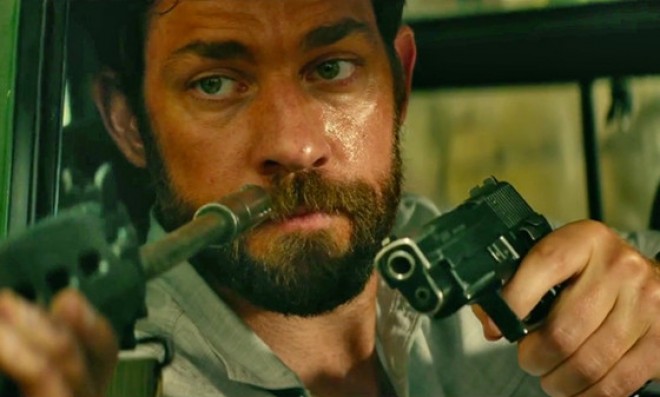
13 Hours: The Secret Soldiers of Benghazi (2016) / War-Action
MPAA Rated: R for strong combat violence throughout, bloody images, and language
Running Time: 144 min.Cast: John Krasinski, James Badge Dale, Pablo Schreiber, David Denman, Dominic Fumusa, Max Martini, Alexia Barlier, David Costabile, Payman Moaadi, Matt Letscher, Toby Stephens
Director: Michael Bay
Screenplay: Chuck Hogan (based on the book, "13 Hours: The Inside Account of What Really Happened in Benghazi", by Mitchell Zuckoff)
Review published January 18, 2016
 13 Hours takes place during a volatile time in Libya, shortly
after the overthrow and murder of their dictator, Muammar Guadaffi in
2011. Various factions began their scramble for power, starting with
raiding the government arsenals for high-powered weaponry, as other
countries, sensing the instability that could lead to atrocities,
pulled out of their embassies in the area. The U.S. did keep a
small outpost of diplomats in the city of Benghazi, as well as a
hidden CIA annex not far away that was under the protection of a small
band of armed ex-Special Forces contractors working for a CIA-funded
organization called Global Response Staff. Former Navy SEAL Jack
Silva (Krasinski, Aloha) is the new guy in the group of six beefy, bearded men, led by
Tyrone 'Rone' Woods (Dale, The Walk), and this time out proves to be the most dangerous
contract work for everyone involved.
13 Hours takes place during a volatile time in Libya, shortly
after the overthrow and murder of their dictator, Muammar Guadaffi in
2011. Various factions began their scramble for power, starting with
raiding the government arsenals for high-powered weaponry, as other
countries, sensing the instability that could lead to atrocities,
pulled out of their embassies in the area. The U.S. did keep a
small outpost of diplomats in the city of Benghazi, as well as a
hidden CIA annex not far away that was under the protection of a small
band of armed ex-Special Forces contractors working for a CIA-funded
organization called Global Response Staff. Former Navy SEAL Jack
Silva (Krasinski, Aloha) is the new guy in the group of six beefy, bearded men, led by
Tyrone 'Rone' Woods (Dale, The Walk), and this time out proves to be the most dangerous
contract work for everyone involved.